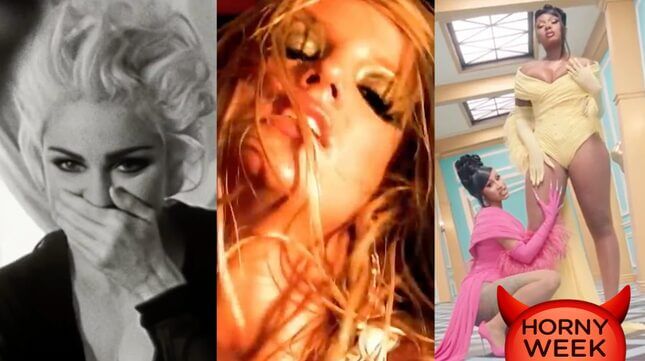A lot of pop stars go through a second puberty right before our eyes and, apparently, for our pleasure. If these musicians emerged into the public consciousness sexless or merely suggestive of sexuality, the introduction of sex into their work often marks an occasion, impregnating their music with a new meaning and urgency.
Singing about sex has defined many a pop star era. The more pushback they get—and most of them get pushback for being bad influences or creatively bankrupt, as if selling one’s sex on a global stage and making people like it doesn’t require ingenuity—the more “important” pushing back against sex negativity seems. Of course, criticism comes with the territory of stardom, and the naysayers rarely drown out the talking money of fans and admirers. In the end, sex sells, and one sure way to maximize profits is to turn the entire process into a ceremony.
Women in pop tend to make grander gestures, probably in part because guys get away with slipping sex into their music more casually, without it being a thing. Prince never had a sexual awakening, because he arrived ready; in his first Top 20 hit on the Billboard Hot 100, “I Wanna Be Your Lover,” he declared, “I wanna be the only one who makes you come…running!” Tee hee! By his next album, 1980's Dirty Mind, he was singing about sex with his sister. Men in pop can surf a tide of entitlement, assuming everyone knows what they’re talking about even when it’s nonsense. Justin Timberlake had one of the biggest hits of his career in a song in which he declared he was bringing sexy back, though it was all tell/no show. What did that even mean? What exactly did he do with it when it was supposedly back? I couldn’t tell!
There are also big stars who never go through pop puberty. Adele seems destined to remain functionally chaste in her work. Whitney Houston’s music didn’t really take that sexy of a turn—her early hit about cheating with a married man, “Saving All My Love for You,” focused on anticipation and absence. It was only through interviews (like when she told Diane Sawyer the one thing she was addicted to was “making love”) and Being Bobby Brown that she pulled the curtain back on apparently a robust libido.
While many artists have claimed that the sexual expression in their music is a (however rough) translation of their actual lives, it would be a mistake to ignore the commodification at hand. Selling one’s sexuality is a group effort, informed in part by collaborators, producers, and label executives. Last year, Da Brat told Tamron Hall that she started shedding clothes and rapping more hornily at one point in her recording career because she was told she needed to be fuckable to sell albums. The section of the recent Lifetime JANET JACKSON. documentary that focuses on the making of the 1993 janet. album suggests that Jackson’s then-husband, René Elizondo Jr., was a major force in the sexification of her sound, which Jackson initially approached with timidness.
Jackson didn’t merely dabble with sexy pop before moving on—it became a recurring theme, with each album that followed janet. offering the opportunity to explore a new kink or act (Jackson would go on to sing about bondage, S&M, masturbation, and oral). Instead of treating sex like a passing phase, she invested in it. If selling sexuality was a gimmick, it was a long con gimmick. This worked for about a decade, until it didn’t. Apparently, the unveiling of her nipple at the 2004 Super Bowl was one envelope push too far for audiences, and especially, cultural gatekeepers.
It goes to show that sex can be a shaky ground for an audience in a country as sex-negative and hypocritical as the United States. It can titillate or repel, and there’s no way to predict the degree or duration of an audience’s tolerance. To assume that one is taking the easy route by starting to express sexuality is to ignore the considerable risk in doing so. That’s what often makes this kind of pop—music that exists to be user-friendly—so exciting.
What follows are some examples of the major sexual awakenings in pop music, what the artists themselves said about expressing their sexuality in their work, and what commentators and critics said in response—good, and most tellingly, bad.
















































































